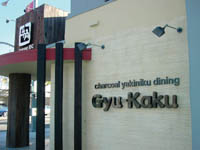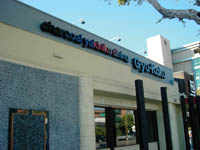Japan's Restaurant Giants are California Dreaming
Back to Contents of Issue: March 2004
|
|
|
|
by Michael Thuresson |
|
|
Global-Dining operates several chains: the Asian fusion-styled Monsoon Cafe, the Italian La Boheme Cafe and the giant tavern Gonpachi, which serves various Japanese dishes. The company is led by 53-year-old maverick restaurateur Kozo Hasegawa, who has made the restaurants favorites in Japan's ultra-competitive dining scene through an eclectic blend of traditional Japanese style and cosmopolitan food. The company has skyrocketed to prominence in recent years -- it currently operates more than 30 restaurants in Tokyo -- through both its financial success as well as VIP publicity.
In February 2002, US President George W. Bush and Japan's Prime Minister Junichiro Koizumi dined at the company's Gonpachi restaurant in Tokyo's upscale Nishi-Azabu neighborhood. The international coverage of the meal added to the attention Hasegawa had been receiving for his controversial personnel management style, which gives co-workers the responsibility of reviewing individual employees' work performance. Highly rated employees can quickly advance -- a radical concept in a seniority-based society.
Reins' Gyu-Kaku yakinuku restaurants are the brainchild of chief executive Tomoyoshi Nishiyama, who left the real estate industry to form the chain in 1995. Attentive service has become the hallmark of Gyu-Kaku, and Nishiyama has opened more than 700 Gyu-Kaku restaurants in Japan. The restaurants are a picture of efficiency and have produced staggering results in the face of the mad-cow epidemic that has stained the global meat industry over the past few years.
Sales in Japan's restaurant industry have been declining over the past five years, according to the Japan Food Service Association. To avoid stagnation in Japan, both companies have set their sites on the US market. Catering to the diversity of American tastes has been less of a challenge than exporting the service styles that have produced both companies' impressive results in Japan's otherwise gloomy market.
Global-Dining, with US operations based in West Hollywood, has been testing the waters for years with its restaurants in fashionable areas of Los Angeles. It has operated a Monsoon Cafe for several years on Santa Monica's Third Street Promenade, a beachside area featuring several blocks of bars and restaurants. Meanwhile, it has also operated a La Boheme Cafe in West Hollywood.
These earlier forays have not fared as well as hoped. Global-Dining has struggled to export its brand of quality service. "The service is very good in Japan. Over here, it's not. We want to bring a whole team effort concept over," says Nile Park, chief operating officer of Global-Dining Inc. USA.
Park said the problem is exacerbated in Los Angeles, where many restaurant employees are looking for jobs in the local movie and television industries and don't buy into the Japanese team concept. "That's difficult to translate. There are too many out-of-work actors who want to do other things and don't take it as seriously," he said.
The rough translation, of course, goes both ways. In 2000, a restaurant reviewer at the Los Angeles Times newspaper criticized the "too attentive" service at La Boheme Cafe. "Someone wanted to pour more water into untouched water glasses every few minutes. Our wine was assiduously topped up in half-inch increments," the reviewer wrote. "And we must have been asked a dozen times how we liked the meal, or if everything was prepared to our liking." The restaurant's disappointing performance, the reviewer suggested, had more to do with overzealous service and its frequent changes in chefs.
The company will fly in chefs from Japan on short-term visas to help solve the service problem in the States. But cultural differences may prevent even an approximate duplication of the service quality. In Japan, where there is no tipping system, the salaries of the company's restaurant managers are tied directly to food sales, while peer-to-peer colleague reviews decide promotions. The pressure leads most Japan managers to regularly perform service tasks with the staff -- which could be found illegal under US employment law if managers stay after hours to help and aren't paid for every minute of overtime work, notes Park. The company must closely monitor the hours and responsibilities of its US managers, affecting service quality as a result.
Reins has had productivity problems as well, stemming from Americans' unfamiliarity with Gyu-Kaku's yakiniku fare, a Korean-style cuisine where customers grill their own bite-sized pieces of meat on tabletop grills and dip them in sauces. To accommodate this, it has adopted a more familiar and instructive style of service than it provides in Japan, where servers are taught to be quick and attentive with little personal interaction. The result has been slower service.
"The productivity of American waiters is a little lower than with Japanese because they are not familiar with the concept. The Japanese service level is very high," says Aki Yamaguchi, supervisor at VR Partners Inc., an L.A.-based joint venture between Reins and Japanese restaurant consulting firm Venture Link International Inc., which operates Reins' US restaurants.
The company's labor costs are three percent higher in US stores. But the costs of food are are a full five percent cheaper because American meat is used in all restaurants, saving the company import taxes. (It's not yet clear if or how the US mad-cow case will affect this system.) The company is basing its US expansion on the early success of its flagship Gyu-Kaku in west Los Angeles, which opened in July 2001.
Reins opened two Gyu-Kaku restaurants this year, one located across the street from Global-Dining's Gonpachi site in Beverly Hills and another in Torrance, which has the highest concentration of expatriate Japanese of any city in Los Angeles County. The company has the goal of adding another 1,000 restaurants in the US by 2013 and will open three restaurants next year, most likely in Newport Beach (about 45 minutes south of Los Angeles), Las Vegas and San Francisco. An initial public offering on the Nasdaq stock market is planned within four years, at which point the expansion would accelerate.
Reins and Global-Dining are following the lead of Japan's Yoshinoya D&C Co., an operator of beef-bowl fast food restaurants that has operated in California for 20 years and now has 80 restaurants in the state. Yoshinoya has succeeded because it focuses on sustaining food quality while keeping distribution costs low, according to Robert Brasch, president of Pacific Partners Inc., a Beverly Hills-based consulting firm that manages strategic relationships between Japanese and American retail chain stores.
To keep its high standards for customer service and control costs, Yoshinoya has used Japanese trading giant Itochu Corp. for its US distribution. Efficient distribution is critical to the success of a large-scale restaurant chain. The Japanese have long operated a centralized system that consolidates the restaurant's various food products into a few deliveries so as to limit the intrusion each delivery makes upon operations. While Reins has yet to decide upon a distribution strategy, local industry watchers warn it would be wise to do the same if it wants to keep its costs in line with its Japan operations. "The American distribution companies do not have the state-of-the-art system the Japanese have. Here, it's less cost-effective," says Brasch.
To make up for service and operational difficulties, the restaurants are ready to Americanize. Gyu-Kaku has already made an effort to appeal to the local sweet tooth. A waiter in Reins' flagship West Los Angeles restaurant decided that the yakiniku grills would make a fine instrument for cooking "s'mores," a dessert that sandwiches pieces of chocolate and fire-seared marshmallow between graham crackers. "S'mores are our leading dessert item now. Our staff has some unique ideas to attract American people," says Yamaguchi.
Will such bicultural fusions bridge the performance gap both Reins and Global-Dining expect to face as they expand? Those familiar with both cultures think so. "The service will never be what they have in Japan -- but the expectation of the clientele will be lower anyway, so it shouldn't make a difference," says Brasch.
@
|
|
Note: The function "email this page" is currently not supported for this page.


 LOS ANGELES IS THE starting point for the international expansion plans of two of Japan's most recent restaurant success stories. Reins International Co. and Global-Dining Inc., both of which grew to prominence during Japan's recession, are placing their US bets on early returns showing American diners gobbling down their contemporary Japanese fare.
LOS ANGELES IS THE starting point for the international expansion plans of two of Japan's most recent restaurant success stories. Reins International Co. and Global-Dining Inc., both of which grew to prominence during Japan's recession, are placing their US bets on early returns showing American diners gobbling down their contemporary Japanese fare.
 Undeterred, Global-Dining will open its first US Gonpachi restaurant in the famous Restaurant Row area in ritzy Beverly Hills in the fall of 2004 and intends to follow with several more in major US cities over the next few years. Gonpachi, a giant tavern serving sushi and Japanese meat and noodle dishes, will try harder to emphasize the strict management style and high level of service it has used to succeed in Japan.
Undeterred, Global-Dining will open its first US Gonpachi restaurant in the famous Restaurant Row area in ritzy Beverly Hills in the fall of 2004 and intends to follow with several more in major US cities over the next few years. Gonpachi, a giant tavern serving sushi and Japanese meat and noodle dishes, will try harder to emphasize the strict management style and high level of service it has used to succeed in Japan.



